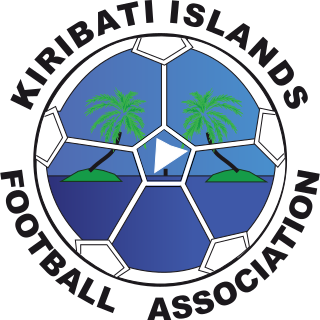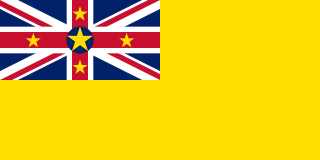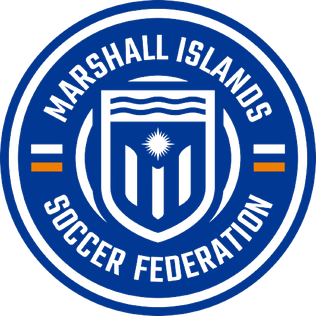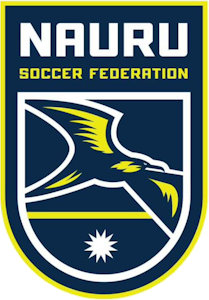
The Oceania Football Confederation (OFC) is one of the six continental confederations of international association football. The OFC has 13 members, 11 of which are full members and two which are associate members not affiliated with FIFA. It promotes the game in Oceania and allows the member nations to qualify for the FIFA World Cup.

The Fiji men's national football team is Fiji's national men's team and is controlled by the governing body of football in Fiji, the Fiji Football Association. The team plays most of their home games at the HFC Bank Stadium in Suva.

The Vanuatu men's national football team represents Vanuatu in men's international football competitions. The team is governed by the Vanuatu Football Federation, which is currently a member of FIFA and the Oceania Football Confederation.

The Cook Islands men's national football team is the men's football team that represents the Cook Islands in international competition since 1971. It is governed by the Cook Islands Football Association which is part of the Oceania Football Confederation (OFC) and FIFA.

The Kiribati men's national football team is the national men's football team of Kiribati and is controlled by the Kiribati Islands Football Association. Kiribati is not a member of FIFA but is an associate member of the Oceania Football Confederation (OFC), and is therefore not eligible to enter the FIFA World Cup but may enter the OFC Nations Cup. It became a provisional member of the N.F.-Board on 10 December 2005.

The Tuvalu national football team is the international football team of Tuvalu. Football in Tuvalu is played at the club and international level. The Tuvalu national team draws players from the Tuvalu A-Division and trains at the Tuvalu Sports Ground at Funafuti. The national team competes in the Pacific Games, and is controlled by the Tuvalu Islands Football Association, which is an associate member of the Oceania Football Confederation (OFC) but not a member of FIFA.

The Niue national soccer team is the national soccer team of Niue, an associated state of New Zealand.

The OFC Futsal Championship is the main national futsal competition of the Oceania Football Confederation (OFC) nations. It was first held in 1992.
The OFC U-19 Championship is a tournament held once every two years to decide the under-19 champions of Oceania and also decides who will represent Oceania Football Confederation (OFC) at the biennial FIFA U-20 World Cup.
The Australia national futsal team, nicknamed the Futsalroos, represents Australia in men's international futsal. The team is controlled by the governing body for soccer in Australia, Football Australia, which is currently a member of both the Asian Football Confederation (AFC) and the regional ASEAN Football Federation (AFF) since leaving the Oceania Football Confederation (OFC) in 2006. The team's official nickname is the Futsalroos.

Sport in Oceania varies from country to country. The most popular playing sport for men in Australia is Australian rules football, while for women is netball. Australian rules football is the most popular sport in terms of spectatorship and television ratings. Rugby union is the most popular sport among New Zealanders, while in Papua New Guinea rugby league is the most popular. Cricket is another popular sport throughout the Oceania region.

The Kiribati Islands Football Association, formerly the Kiribati Islands Football Federation, is the governing body of football in Kiribati, established in 1980. It organises the nation's football league, the Kiribati National Championship, as well as controlling national men's, women's and futsal teams.

Association football is the most popular sport in Tuvalu. Football in Tuvalu is governed by the Tuvalu National Football Association (TNFA). The TNFA became an associate member association of the Oceania Football Confederation (OFC) on 15 November 2006 with a further reinstatement on 16 March 2020. The TNFA has been wanting to become a full member of the OFC and a member of FIFA since 1987.

The Tuvalu Islands Football Association (TIFA) is the governing body of football in Tuvalu. The association is responsible for the Tuvalu national football team and the Tuvalu national futsal team. Tuvalu is not a full member and is not affiliated with FIFA. It does not compete in FIFA World Cup Qualifiers because of its non-affiliation.
Soccer is a minor sport in the island country of Nauru. The country is not a member of FIFA.

The Tuvalu national futsal team is the representative team for Tuvalu in international futsal competitions. It is controlled by the Tuvalu Islands Football Association. They have never won a game. Tuvalu participates in the Oceanian Futsal Championship.

The Marshall Islands Soccer Federation is the governing body of soccer in the Marshall Islands. Marshall Islands is not a member of its regional body, the Oceania Football Confederation (OFC), or FIFA, but is working on becoming one. The federation is recognized by the Marshall Islands National Olympic Committee. It currently organizes the national team, national futsal team, and women's national futsal team.

The Nauru Soccer Federation is the governing body of soccer in Nauru and is under the auspices of the Nauru Olympic Committee. Nauru is not a member of the Oceania Football Confederation (OFC) and is one of the few sovereign states that is not a member of FIFA but aims to become a member of both governing bodies.










